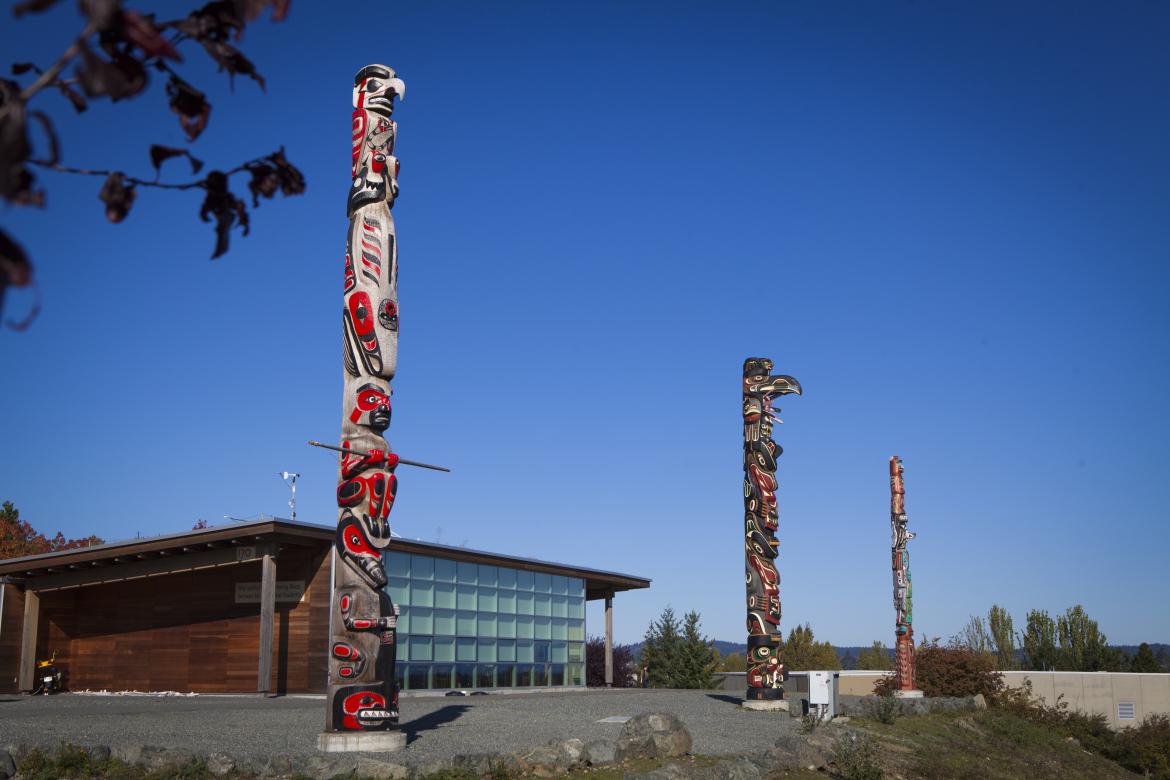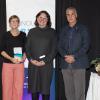
Three totem poles stand tall outside Shq'apthut, VIU's Aboriginal Gathering Place.The totems represent the three First Nations language groups within the regions VIU serves A community celebration to recognize the totems – part of VIU’s Reconciliation Road series - is being held tomorrow, Wednesday, October 13, beginning at 11 am at Shq'apthut.
October 11, 2016 - 12:30pm
It began with the launch of the nationally recognized Witness Blanket art installation and will continue into 2017. Vancouver Island University (VIU) is honoured to announce the start of Reconciliation Road: Join the Journey with VIU, a series of events and activities that support the process and meet the challenge of reconciliation between Canada’s Indigenous and non-Indigenous peoples.
Canada’s Truth and Reconciliation Commission (TRC) report, released in 2015, included a clear call to action for educational institutions to take responsibility for leading the way in addressing the challenge of reconciliation. For many years VIU has been on that path – one of the University’s fundamental values has been to build and maintain positive reciprocal relationships with First Nations communities and to create a welcoming, supportive and culturally relevant environment for Indigenous students. Reconciliation Road is one more step in the ongoing journey of this work and another way VIU is honouring the responsibility laid out by the TRC.
“We are at a pivotal moment in our country's history, made even more critical by the calls to action of Canada's Truth and Reconciliation Commission,” says Douglas White, Director of VIU’s Centre for Pre-Confederation Treaties and Reconciliation. “We face a great challenge as a nation; one that requires real courage and leadership from every Indigenous person and every Canadian. We must, all of us together, change, grow, and bring into being a new version of our country that is built upon respect, recognition, justice and altruism.”
The goal of Reconciliation Road is to engage Canadians across the country in numerous events, activities and conversations, that are focused on the challenge of reconciliation, why it’s important, and how they can get involved.
“The TRC indicated that education would play a critical role in the process of reconciliation between Canada’s Indigenous and non-Indigenous peoples and VIU takes that role very seriously,” says Dr. Ralph Nilson, VIU’s President and Vice-Chancellor. “As a post-secondary institution it is our responsibility to create a safe space where challenging topics such as reconciliation can be raised and explored; where frank conversations can be had, with the goal of gaining a better understanding of how we can address these complex issues that are of critical importance to our society. Our hope is that Canadians from across the country will engage in Reconciliation Road and in doing so will help to bring all of us a little bit further along the path towards reconciliation.”
Currently there are more than 20 events planned for the series; a full list is available on the Reconciliation Road website. Key events include the Witness Blanket art installation – a nationally recognized work that is a powerful demonstration of the impact of Canada’s Residential School Era; the raising of a third totem pole at Shq’apthut, VIU’s Aboriginal Gathering Place; a concert with Buffy Sainte-Marie, part of the Port Theatre's Spotlight Series; the inaugural meeting of the Advisory Council to the Centre for Pre-Confederation Treaties and Reconciliation, that includes national leaders such as TRC Commissioner Chief Wilton Littlechild; the second annual Indigenous Speaker Series in partnership with the Laurier Institution and CBC Radio One Ideas; and Testify, which pairs lawyers and artists together to create conversations around the theme of reconciliation.
"Education is key - we understand that,” says Dr. Sharon Hobenshield, VIU’s Director of Aboriginal Education. “In the past education was used to destroy the very fabric of First Nation communities in Canada. Because of this, our educational institutions shoulder a deep responsibility to ensure that the power of education is today used to break down barriers; build bridges and find ways to move forward in the reconciliation process. This is not an easy task and will require a deep commitment – and it’s important that VIU is creating space for this critical and important work to be done.”
As well as the cornerstone events, numerous other activities will be taking place including: a panel on Indigenous law and reconciliation at the State of the Island Economic Summit; Coast Salish Protocol Sessions; an Indigenous Book Circle; workshops on Conversations Toward Reconciliation and Healing; and the national MBA Games in January 2017, hosted by VIU’s MBA department and focused on raising awareness of the Moose Hide campaign, which aims to address violence against Indigenous women and girls.
“Education is vital,” says Gary Manson, Elder-in-residence at VIU and member of the Snuneymuxw First Nation. “These events that are planned, for example the Witness Blanket art installation, speak to the truth of our history, of Canada’s history. They speak to what the colonizers did; and speak to the spirit of our survivors. To understand this fully, it will take time. It will mean coming back to this topic many times, in different ways. This is powerful work, and it is right that an educational institution – VIU – is taking this work on, making it possible for our communities – Indigenous and non-Indigenous – to come together to learn which I hope will lead to understanding.”
A full list of events and activities is available on the Reconciliation Road website (www.viu.ca/reconciliationroad).
Media Contact
Janina Stajic
Manager Communications & Public Engagement, Vancouver Island University
P:250.740.6288 C: 250.618.2360 E: Communications@viu.ca
Tags: In the Community





